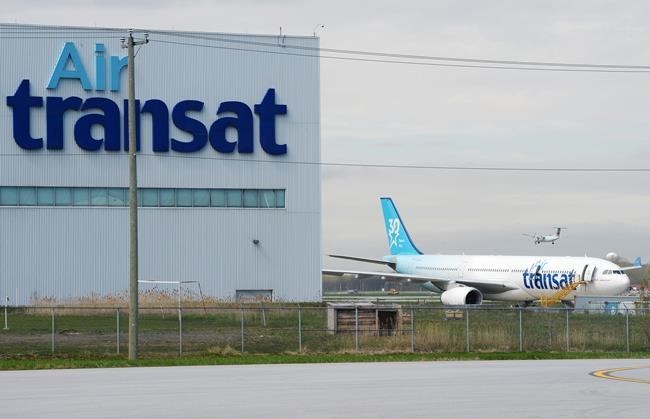CALGARY — Transat AT Inc. has seen steady customer demand since resuming flights earlier this summer, but the travel company said Thursday it still doesn't expect to return to its pre-pandemic level before 2023.
Montreal-based Transat began a gradual resumption of flying on July 30 after grounding its fleet on Jan. 29 when Ottawa requested a suspension of travel to Mexico and the Caribbean as well as the adoption of new quarantine measures and testing requirements.
The airline has since ramped up to 50 flights per week for the month of September and will increase to 70 flights per week in October, with 11 aircraft in operation, said chief executive Annick Guérard.
In a conference call with analysts Thursday, Guérard said more than 90 per cent of Transat's destinations have been reopened. The airline's overall capacity this winter is still expected to be 35 per cent lower than it was prior to the COVID-19 pandemic, but Guérard said load factors (a measure of an airline's ability to fill its planes) and pricing have been better than anticipated.
"We currently see good trends in the bookings, even if they tend to come in closer to the departure date than they used to," Guérard said. "People are still cautious, and they decide at the last minute. But it is very clear that they are eager to travel."
Guérard said Transat is particularly encouraged with the pace of bookings for sun destinations in Mexico and the Caribbean this winter. The company has been using its progressive restart this fall to recall and retrain laid-off employees in preparation for the winter travel season.Â
Still, Transat said it remains impossible to predict the impact of the Delta variant and the fourth wave of the pandemic on its operations going forward. The company is not providing investors with an outlook for the remainder of 2021 or winter 2022.
Guérard said high vaccination rates remain essential for the recovery of the travel and tourism industry. Transat, like competitors Air Canada and WestJet Airlines, will require all of its employees to be fully vaccinated in accordance with a federal mandate for Canada's air, rail and marine transportation sectors.
"Everyone must do their part to ensure that we eventually overcome the virus," she said. "We are impatient to see the details of the planned legislation on the topic."
Robert Kokonis, president of independent aviation consultancy AirTrav Inc., said there is undoubtedly pent-up demand among Canadians for international travel heading into the winter season.
However, he said while the federal government's decision to remove the mandatory quarantine requirement for fully vaccinated incoming travellers has made Canadians more likely to consider a vacation, barriers still exist. The most significant of these, he said, is the requirement that all Canadians returning from abroad — including the fully vaccinated — test negative for COVID-19 within 72 hours of their incoming flight.
"I think one of the things dragging (the airline industry) down, and Transat would be the first to acknowledge it, is the continued requirement for PCR tests," Kokonis said. "That PCR test requirement does cap demand."
Transat said Thursday it lost $138.1 million in its latest quarter compared with a loss of $45.1 million in the same quarter last year.
The loss amounted to $3.66 per diluted share for the quarter ended July 31 compared with a loss of $1.20 per diluted share a year earlier.
Revenue in what was the company's third quarter totalled $12.5 million, up from $9.5 million a year ago.
On an adjusted basis, Transat said it lost $3.06 per diluted share in its latest quarter compared with an adjusted loss of $3.70 per diluted share in the same quarter last year.
The company said it has implemented a series of operational, commercial and financial measures, including new financing and cost reduction measures aimed at preserving its cash. As at July 31, 2021, cash and cash equivalents totalled $429.4 million, the company said.
While Transat will likely experience a "robust rebound" in 2023, the amount of leverage the travel company will be carrying as it emerges from the pandemic is concerning, said National Bank analyst Cameron Doerksen in a note to clients Thursday.Â
National Bank estimates Transat's net debt at the end of this fiscal year will be $1.1 billion. In April, Transat reached a deal for a $700-million loan from Ottawa. Nearly half of that funding was earmarked for providing refunds to customers whose trips were disrupted by COVID-19 restrictions, while the rest will go toward maintaining operations for the duration of the pandemic.
"Management notes that it is looking for options to refinance existing government-provided debt as well as 'optimizing its capital structure,' suggesting that new equity may be necessary," Doerksen said. "We see the potential for very significant dilution ahead for current shareholders."
This report by The Canadian Press was first published Sept. 9, 2021.
Companies in this story: (TSX:TRZ)
Amanda Stephenson, The Canadian Press

